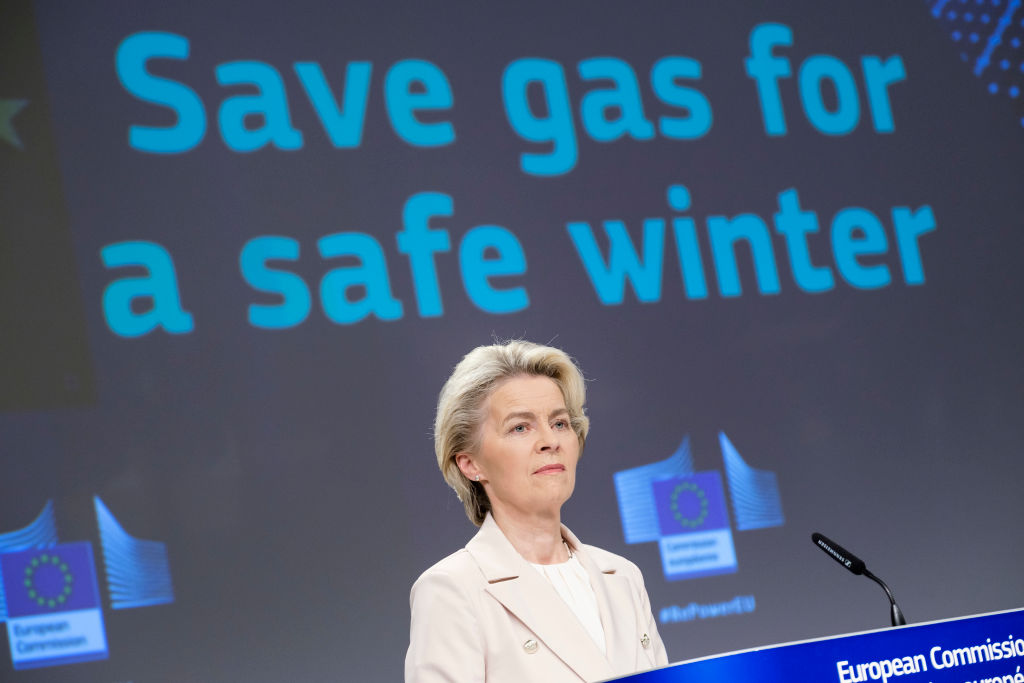EU pushes plan to limit gas consumption amid fears of Russian shut-off


A free daily email with the biggest news stories of the day – and the best features from TheWeek.com
You are now subscribed
Your newsletter sign-up was successful
The European Union on Wednesday implored member countries to cut down on their use of natural gas as the bloc prepares for the possibility of restrictions on Russian supply.
The European Commission, the EU's executive body, on Wednesday released a plan asking countries to reduce consumption by 15 percent between Aug. 1, 2022 and March 31, 2023 "compared with the five-year average for the same period," The Washington Post reports. The body's plan also asks governments to switch to alternative fuels, provides incentives for industries to cut consumption, and details ways consumers can reduce their impact when heating and cooling.
News of the commission's proposal arrives after Russian President Vladimir Putin warned Tuesday that gas supplies sent from Russia to Europe via the Nord Stream 1 pipeline could be impacted by Western sanctions, The Wall Street Journal reports. The Nord Stream is on Thursday set to resume operations after a 10-day maintenance period, though Europe is nervous about what might actually happen, the Post adds.
The Week
Escape your echo chamber. Get the facts behind the news, plus analysis from multiple perspectives.

Sign up for The Week's Free Newsletters
From our morning news briefing to a weekly Good News Newsletter, get the best of The Week delivered directly to your inbox.
From our morning news briefing to a weekly Good News Newsletter, get the best of The Week delivered directly to your inbox.
"Russia is blackmailing us. Russia is using energy as a weapon. And therefore, in any event, whether it's a partial major cutoff of Russian gas or total cutoff ... Europe needs to be ready," Commission President Ursula Von der Leyen told a press conference. "We have to prepare for a potential full disruption of Russian gas," she continued. "And this is a likely scenario."
The commission has said it would make the recommendations outlined Wednesday binding should they not be enough to combat the situation when enacted voluntarily. In both instances, member state approval is required, per the Journal.
A free daily email with the biggest news stories of the day – and the best features from TheWeek.com
Brigid Kennedy worked at The Week from 2021 to 2023 as a staff writer, junior editor and then story editor, with an interest in U.S. politics, the economy and the music industry.
-
 What are the best investments for beginners?
What are the best investments for beginners?The Explainer Stocks and ETFs and bonds, oh my
-
 What to know before filing your own taxes for the first time
What to know before filing your own taxes for the first timethe explainer Tackle this financial milestone with confidence
-
 The biggest box office flops of the 21st century
The biggest box office flops of the 21st centuryin depth Unnecessary remakes and turgid, expensive CGI-fests highlight this list of these most notorious box-office losers
-
 Judge blocks Hegseth from punishing Kelly over video
Judge blocks Hegseth from punishing Kelly over videoSpeed Read Defense Secretary Pete Hegseth pushed for the senator to be demoted over a video in which he reminds military officials they should refuse illegal orders
-
 Trump’s EPA kills legal basis for federal climate policy
Trump’s EPA kills legal basis for federal climate policySpeed Read The government’s authority to regulate several planet-warming pollutants has been repealed
-
 House votes to end Trump’s Canada tariffs
House votes to end Trump’s Canada tariffsSpeed Read Six Republicans joined with Democrats to repeal the president’s tariffs
-
 Bondi, Democrats clash over Epstein in hearing
Bondi, Democrats clash over Epstein in hearingSpeed Read Attorney General Pam Bondi ignored survivors of convicted sex offender Jeffrey Epstein and demanded that Democrats apologize to Trump
-
 El Paso airspace closure tied to FAA-Pentagon standoff
El Paso airspace closure tied to FAA-Pentagon standoffSpeed Read The closure in the Texas border city stemmed from disagreements between the Federal Aviation Administration and Pentagon officials over drone-related tests
-
 Judge blocks Trump suit for Michigan voter rolls
Judge blocks Trump suit for Michigan voter rollsSpeed Read A Trump-appointed federal judge rejected the administration’s demand for voters’ personal data
-
 US to send 200 troops to Nigeria to train army
US to send 200 troops to Nigeria to train armySpeed Read Trump has accused the West African government of failing to protect Christians from terrorist attacks
-
 Grand jury rejects charging 6 Democrats for ‘orders’ video
Grand jury rejects charging 6 Democrats for ‘orders’ videoSpeed Read The jury refused to indict Democratic lawmakers for a video in which they urged military members to resist illegal orders
